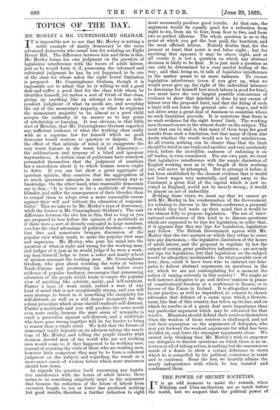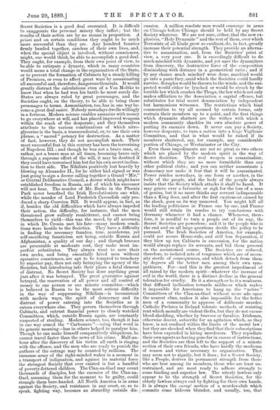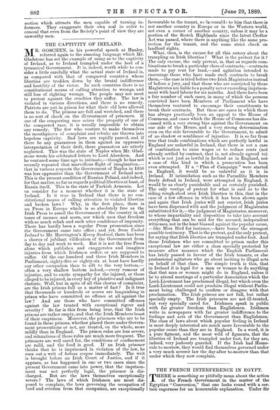THE POWER OF SECRET SOCIETIES.
IT is an odd moment to make the remark, when Nihilism and Clan-na-Gaelism are so much before the world, but we suspect that the political power of Secret Societies is a good deal overrated. It is difficult to exaggerate the personal misery they inflict ; but the results of their action are by no means in proportion. A priori and on certain conditions they ought to be much more successful than they are. Any hundred fanatics firmly banded together, careless of their own lives, and, when the special object is involved, without consciences, might, one would think, be able to accomplish a good deal. They ought, for example, from their own point of view, to be able to extirpate a dynasty, which in many countries would mean a total change in the organisation of the State, or to prevent the formation of Cabinets by a steady killing of Premiers, or even to affect great wars by assassinating all successful and, therefore, dangerous Generals. It would greatly distract the calculations even of a Von Moltke to know that when he had won his battle he must surely die. States are always ruled by great personages, and the Societies ought, on the theory, to be able to bring those personages to terms. Assassination, too, has in one way be- come a great deal easier. Nobody nowadays dwells willingly in a fortress. Modern science enables assassins with money to go everywhere at will, and has placed improved weapons within the reach of the desperate ; and they themselves attribute to the various combinations of which nitro- glycerine is the basis, a transcendental, or, to use their own phrase, a " sacred" potency for destruction. As a matter of fact, however, they do not accomplish much. Their most successful feat in this century has been the terrorising of Napoleon III. ; and though he was not a brave man, or, rather, not a brave man at all times, becoming brave only through a supreme effort of the will, it may be doubted if they could have terrorised him but for his own secret inclina- tion to their side. The Nihilists positively lost heavily by blowing up Alexander II., for he either had signed or was just going to sign a decree calling together a Grand " Mir," or Central Deliberative Council, a decree which might have established freedom in Russia, and of which his successor will not hear. The murder of Mr. Burke in the Phoenix Park never benefited the Irish Revolutionists one whit, while the murder of Lord Frederick Cavendish only pro- duced a sharp Coercion Bill. It would appear, in fact, as if, besides the old difficulties which have always impeded their action, the difficulty, for instance, that the men threatened grow sullenly recalcitrant, and cannot bring themselves to yield—this was the mood, by all accounts, in which Dr. Cronin met his fate—many modern condi- tions were hostile to the Societies. They have .a difficulty in finding the necessary fanatics, true, murderous, yet self-sacrificing fanaticism not being, outside Russia and Afghanistan, a quality of our day ; and though bravoes are procurable at moderate cost, they make most im- perfect substitutes. They always want to save their own necks, and being essentially hired men without operative consciences, are apt to be tempted to treachery by superior pay, thus not only betraying the agency of the Societies, but introducing into their plans a fatal element of distrust. No Secret Society has done anything great just after it was betrayed. The great guarantee against betrayal, the reservation of all power and all control of money to one person or one minute committee—which is believed in Russia to be the most serious difficulty in the way of suppressing Nihilism—is inconsistent with modern ways, the spirit of democracy and its distrust of power entering into the Societies as it enters everywhere else. They govern themselves through Cabinets, and entrust financial power to closely watched Committees, which, outside Russia again, are constantly suspected of stealing. Modern science, too, though it has in one way armed the " Carbonaro "—using that word in its generic meaning—has in others helped to paralyse him. Though he can make himself comparatively ubiquitous, he cannot travel faster than the news of his crime. Half-an- hour after the discovery of his victim all earth is ringing with the offence, and the men who are ready to punish the authors of the outrage may be counted by millions. The immense army of the right-minded wakes in a moment in a transport of indignation, and against its material force the strongest Society that ever existed is but a handful of poverty-fettered children. The Clan-na-Gael may count thousands of disciples, but the enemies of the Clan-na- Gael, assuming them for the moment to be guilty, could strangle them bare-handed. All North America is in arms against the Society, and resistance in any overt, or, so to speak, fighting way, becomes an absurdity outside dis- cussion. A million resolute men would converge in arms on Chicago before Chicago should be held by any Secret Society whatever. We are not sure, either, that the new ex- plosives, "Holy Dynamite " and the rest of them, over which Terrorists of all kinds grow so exultant, do, in fact, greatly increase their potential strength. They provide an alterna- tive to assassination, and, from the Societies' point of view, a very poor one. It is exceedingly difficult to do much mischief with dynamite, and yet save the dynamiters from discovery, the destructive force of the composition diminishing with distance in a geometrical ratio ; and if by any chance much mischief were done, mankind would go into a panic fury, amid which the Societies could hardly survive. Scruples would be thrown to the winds, and the sus- pected would either be lynched or would be struck by the terrible law which crushes the Thugs, the law which not only makes affiliation to the Association a capital offence, but substitutes for trial secret denunciation by independent but harmonious witnesses. The restrictions which bind communities to try all accused by certain forms, only restrain their members up to a point, and the first things which dynamite shatters are the withes with which a modern community shackles its own absolute power of putting its enemies down. It never can pay a Society, however desperate, to turn a nation into a huge Vigilance Committee, and that is what would be risked if its members shattered, say, for example, any considerable portion of Chicago, or Westminster or the City. Even these impediments are not so great as two others which are placed by the modern spirit in the way of Secret Societies. Their real weapon is assassination, without which they are no more formidable than any other political clubs ; and you can neither assassinate a democracy nor make it fear that it will be assassinated. Power resides nowadays, in one form or another, in the body of the people, and the body of the people always insists that the Society which attacks it shall be faced. It may grieve over a favourite or sigh for the loss of a man of genius, but it no more thinks any servant indispensable than a King does, and after the first excitement caused by the shock, goes on its way unmoved. You might kill all the leading politicians in France one by one, and France would still retain its resolve to try conclusions with Germany whenever it had a chance. Whenever, there- fore, it is needful to turn a people out of its way, the Secret Societies are powerless ; and it is the people who in the end and on all large questions decide the policy to be pursued. The Irish Societies of America, for example, could not secure Home-rule, and still less Separation, if they blew up ten Cabinets in succession, for the nation would always replace its servants, and bid them proceed on the accustomed course. The Societies are reduced, therefore, to isolated acts of vengeance which are of neces- sity sterile of consequences, and which detach from them by degrees all the better men among their own sym- pathisers. For—and this is the greatest impediment of all raised by the modern spirit—whatever the increase of evil in the world, there is a distinct decline in the general toleration for cruelty. Be it a strength or be it a weakness, that diffused inclination towards mildness which makes it impossible for Americans to hang up the " active " Committees of the Clan-na-Gael without more ado upon the nearest elms, makes it also impossible for the better men of a community to approve of deliberate murder. Catholic Prelates in Ireland tolerate methods of resisting rent which morally are violent thefts, but they do not excuse blood-shedding, whether by bravoes or fanatics. Irishmen, otherwise decent, subscribe for an agitation which, as they know, is not confined within the limits of the moral law ; but they are shocked when they find that their subscriptions have been expended in hiring murderers. They repudiate their own agents as having gone far in excess of instructions, and the Societies are thus left to the support of a minute section of their own friends, who have hardly the modicum of reason and virtue necessary to organisation. That may seem not to signify, but it does ; for a Secret Society, like a People, derives its permanent strength from those who are best among its members, those who are least un- restrained, and are most ready to adhere strongly to some binding and superior law. The utterly lawless only appear to be the strength of Secret Societies, for the utterly lawless always end by fighting for their own hands. It is always the enrage section of a murder-club which commits some hideous blunder, and usually, too, that section which attracts the men capable of turning in- formers. They exaggerate their own zeal in order to conceal that even from the Society's point of view they are unworthy men.




































 Previous page
Previous page